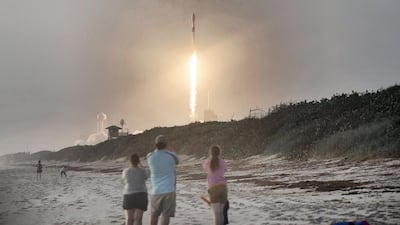Europe needs to do more in space if it is to rival the US and China in an increasingly competitive arena, space leaders say.
The continent has a chance to reposition itself as a major player in what is turning into a new space race, and new initiatives such as a plan to beam the internet from a series of new satellites could spawn the next generation of technology giants, the European Space Conference heard on Tuesday.
European Council president Charles Michel said the move demonstrated the EU was using its weight as a global player as competition in space intensifies.
The plan to develop a mega constellation of satellites in Earth’s orbit was revealed by EU officials in December. The low-orbit constellation, similar to Elon Musk’s Starlink network and the UK-based OneWeb, aims to bring secure government communications and internet services to isolated communities.
The technical study for the €6 billion ($7.3bn) system is underway before the contract for the constellation is expected to be signed by the end of the year.
Aarti Holla-Maini, secretary-general of EOSA, an association of satellite operators across Europe, the Middle East and Africa, said the move would make Europe less reliant on US and China-based technology companies.
“Does Europe want to be a customer of services by non-EU companies? Or does it want to develop those services itself?” she said at the conference.
“Europe lost out on the first generation of the internet. There is no Google, there is no Alibaba.
“But now there is a global realisation of the opportunity it brings … to potentially control the data of 600 million people.”
Mr Michel said the EU was strengthening its space programme to ensure “sustainable space activity”.
“If we want to be stronger and more self-confident on the global landscape, we must also be stronger in space,” he said.
“We must ensure safe, autonomous, reliable and affordable access to space. Of course, we are not alone. As competition in space increases, we need to use our weight as a global player to help build robust global governance. This will be essential to innovative and sustainable space activity.”
One future challenge for Europe in space could be the issue of mining on the Moon.
The conference heard a new global agreement was needed to prevent commercial interests from exploiting the Moon’s raw materials.
“I am scared for the Moon,” said Carlo Iorio, senior researcher at Graphene Flagship.
“An international agreement was made (long in the past) when no one was thinking about mining. It won’t be enough if someone is greedy.”

